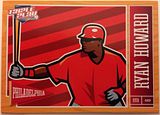- What did he do to deserve a 1976 Kellogg's card?
- Tom Seaver was one of the best (if not the best) pitchers in baseball in the 1970s.
- In 1975 Seaver won his third NL Cy Young Award and was an NL All Star
- Tom led the NL in wins (22) and in strikeouts (243)
- 1976 Highlights:
- Was a holdout during spring training but agreed to terms and became baseball's highest paid pitcher on April 5.
- Had a rough stretch in May, losing four straight starts.
- Pitched two innings in the All Star Game and allowed a solo home run to Fred Lynn
- Had a record of 14-11 with a 2.59 ERA
- Led the NL with 235 strikeouts (his ninth straight 200-plus strikeout season)
Friday, July 15, 2011
1976 Kellogg's #32 - Tom Seaver
Thursday, July 14, 2011
1976 Hostess #136 - Don Money
- Don Money's career didn't really get going until he was traded to the Milwaukee Brewers after the 1972 season.
- Money was an above-average fielder wherever he played and was usually in double figures in home runs.
- Don was a four-time AL All Star (1974, 1976, 1977, and 1978)
- Money was uncomfortable when the Brewers signed third baseman Sal Bando after the 1976 season, but Don got plenty of playing time at second base and first base in the next couple of years.
- Before peak, peak, or after peak? peak
Wednesday, July 13, 2011
1976 Hostess #121 - Mike Cuellar
- This is a nice five-year run for Mike Cuellar. Two 20-win seasons and two others with 18 wins.
- Mike was an important part of the Orioles' rotation from 1969-1975. He won the Cy Young Award in 1969.
- Cuellar was out of gas by the time this card was printed. Mike was removed from the rotation in early June. He went 4-13 with a 4.96 ERA in 1976 and was waived after the season.
- Before peak, peak, or after peak? after peak
Tuesday, July 12, 2011
1976 Hostess #113 - Ted Simmons
- Ted Simmons was one heck of an offensive catcher. He'd be a Hall of Famer if he would have had a better decline phase of his career.
- During this five-year run, Simmons was an All Star in three seasons (1972, 1973, and 1974). He wasn't an All Star in 1975, although he finished 6th in MVP voting that year. Ted declined an invitation to the game for personal reasons.
- After the 1975 season Ted signed a contract calling for $200,000 a year for three years. At the time it was the biggest contract in St. Louis Cardinals' history.
- Simmons scolded "fair weather fans" in St. Louis during the 1976 season.
- Ted had his weakest full season of the decade in 1976, batting .291 with 5 HR and 75 RBI.
- Before peak, peak, or after peak? peak
Monday, July 11, 2011
1976 Hostess #111 - Jeff Burroughs
- This five-year set of stats is full of ups and downs.
- Burroughs was the AL MVP in 1974 and also had good power years in 1973 and 1975
- Jeff's batting average fell of badly in 1975 and he also led the AL with 155 strikeouts
- Burroughs had a similar year in 1976, but he hit only 18 home runs
- Jeff was traded to the Atlanta Braves after the 1976 season. At first he didn't want to go (Burroughs contended that he had a no-trade clause), but he finally relented.
- Burroughs had a couple of good years with the Braves but then he struggled through the 1979 and 1980 seasons.
- Before peak, peak, or after peak? after peak
Sunday, July 10, 2011
1976 Hostess #104 - Rollie Fingers
- Rollie Fingers was one of the premier relievers in baseball in the 1970s and early 1980s
- Fingers was an AL All Star from 1973-1976 and led the AL in appearances in 1974 and 1975
- Rollie won arbitration cases in 1974 ($65,000 vs $55,000 offer) and in 1975 ($89,000 vs $76,000 offer)
- He elected to play out his option in 1976 and took a 20% pay cut
- Fingers (along with Joe Rudi) was sold to the Boston Red Sox but the sale was voided by Commissioner Bowie Kuhn
- Rollie was in limbo for several days as A's owner Charlie Finley ordered the players whose sales were voided benched. The A's players threatened to strike on June 27 but Finley relented at the last minute
- Fingers signed a 6-year, $1.6 million contract with the San Diego Padres after the 1976 season.
Saturday, July 9, 2011
1976 Hostess #96 - Steve Braun
- At this point in his career Steve Braun was a left fielder who mostly started against right-handed pitchers
- Steve's 1972-1976 seasons were a nice run -- each year he batted .280 or higher.
- Braun won his arbitration case in 1974 -- the Twins offered $25,000 and he requested $31,000
- Steve lost his 1975 case -- he asked for $39,500 and the Twins offered $36,500
- Steve wanted the Twins to trade him at the beginning of the 1976 season. He (along with nine teammates) played out his option that year and took a 20% pay cut.
- Braun signed a new contract after the 1976 season instead of testing the free agent market.
- Steve was drafted by the Seattle Mariners in the expansion draft. Perhaps that was the Twins' plan all along. Sign Braun and then have someone else pay the salary. Braun made $100,000 in '77.
- Before peak, peak, or after peak? end of peak
Friday, July 8, 2011
1976 Hostess #95 - Buddy Bell
- Buddy Bell was at the beginning of a long and productive career.
- Bell was traded to the Texas Rangers after the 1978 season.
- Buddy would go on to win six straight Gold Glove awards from 1979-1984
- Before peak, peak, or after peak? before peak
Thursday, July 7, 2011
1976 Hostess #72 - Manny Sanguillen
- Manny Sanguillen was the Pirates' starting catcher during the early and mid 1970s.
- Manny was a consistent hitter who usually batted at or near .300
- Sanguillen's final season as a starting catcher for the Pirates was in 1976
- Manny's best year was in 1975. He batted .328 and made the NL All Star team -- it was his third season as an All Star
- Sanguillen was traded to the Oakland A's before the 1977 season for manager Chuck Tanner
- Manny was traded back to the Pirates before the 1978 season. He was a used as a backup C/1B and as a pinch hitter from 1978-1980
- Before peak, peak, or after peak? end of peak
Wednesday, July 6, 2011
1976 Hostess #71 - Steve Busby
- Steve Busby finished 3rd in AL Rookie of the Year voting in 1973
- Steve was an AL All Star in 1974 and in 1975
- Busby pitched a no-hitter on 27 April 1973 and pitched another one on 19 June 1974
- Steve hurt his arm in 1976 and was unable to pitch as effectively as he did before the injury.
- Busby retired in 1981 after attempting to catch on with the St. Louis Cardinals
- Before peak, peak, or after peak? after peak
Tuesday, July 5, 2011
1976 Hostess #70 - Ted Sizemore
- Ted Sizemore was the Cardinals' starting second baseman for several years in the 1970s
- Ted was the NL Rookie of the Year for the Los Angeles Dodgers in 1969
- These stats are indicative of the typical "good field/no hit" middle infielder that was so prevalent in the 1970s
- Sizemore was traded to the Dodgers before the 1976 season. He backed up Davey Lopes and played in 84 games in '76 before moving on to the Philadelphia Phillies for a few years.
- Before peak, peak, or after peak? after peak
Monday, July 4, 2011
1976 Hostess #65 - Marty Perez
- Marty Perez improved his batting average in each of the five seasons from 1971-1975
- Perez was traded to the San Francisco Giants early in the 1976 season
- Before peak, peak, or after peak? peak (such as it was)
Sunday, July 3, 2011
1976 Hostess #64 - Carlton Fisk
- Carlton Fisk was struggling with injuries during this time in his career
- Fisk was hitting well, but had a hard time staying in the lineup
- In 1974 Carlton took a foul ball in a sensitive place and missed the first three weeks of the season. Fisk went down in late June with a knee injury sustained while blocking the plate. The injury required surgery and Fisk was out for the season
- Carlton broke his elbow during spring training in 1975 and didn't play until June 23
- Fisk was an AL All Star in 1972, 1973, and 1974 -- he didn't play in '74 due to the knee injury
- AL Rookie of the Year in 1972
- Before peak, peak, or after peak? before peak
Saturday, July 2, 2011
1976 Hostess #56 - Jim Palmer
- Those are some really nice looking stat lines
- AL Cy Young Award winner in 1973 and in 1975
- Jim also won the award in 1976
- AL All Star in 1971, 1972, and 1975
- AL ERA leader in 1973 and in 1975
- Led the AL in victories in 1975 -- also led the league with 10 shutouts
- Struggled with a sore arm in 1974 -- was placed on the disabled list on June 27 (retroactive to June 20) and didn't pitch until August 13.
- Before peak, peak, or after peak? peak
Friday, July 1, 2011
1976 Hostess #52 - Bud Harrelson
- As this card demonstrates, Bud Harrelson wasn't in the lineup for his offense.
- Harrelson was an NL All Star and Gold Glove winner in 1971.
- Bud missed much of the 1975 season due to torn cartilage in his knee. He had surgery on the knee in late May and didn't return to the Mets' lineup until September 1.
- Harrelson would go on to start 113 games in 1976 and 84 games in 1977 before moving on to the Philadelphia Phillies to back up Larry Bowa for a couple of years.
- Before peak, peak, or after peak? after peak
Subscribe to:
Posts (Atom)































































































































